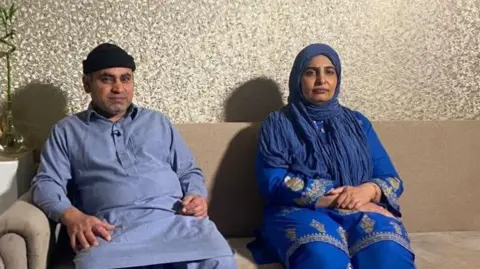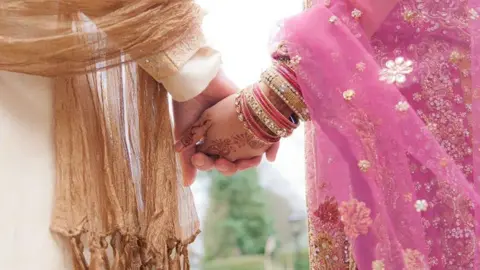Couple defend first-cousin marriages amid ban call
 BBC
BBCFamily life is busy for Israr Hussain and his wife, Tasleem Akhtar, who have four daughters between the ages of five and 15.
They chose to have their wedding back home in Pakistan in 2007 and live in Birmingham.
The 47-year-olds are not only husband and wife, but also first cousins, as both of their fathers are brothers.
Marrying a first cousin is a feature of many communities across the world. It is about protecting wealth, land and property and helps keep the family together.
While marriage between first cousins is not illegal in the UK, medical experts say it can cause genetic diseases in the children they may bear.
Growing up, Mr Hussain and Ms Akhtar were told by their parents that one day they would be married, so when the time came, they never questioned it.
What they were not warned about was any potential health risks that could occur if they had children.
But even if they had known, Ms Akhtar said it would not have made a difference.
"That's God's will, nobody can say anything about that. Even if you marry outside the family, it could still happen," she said.
"So many people have married outside the families and they may still have a child with a disability."
The couple, who moved to the UK in 2004 and have been living in Birmingham since 2009, said all of their daughters were healthy and thriving.
Education programmes
First cousin marriages are more prevalent in certain communities across the UK.
According to a 2021 study, about 55% of British Pakistanis are married to first cousins, while the practice accounts for about 3% of all marriages nationally.
In Birmingham, which has a large British Pakistani population, these unions are a common tradition, though attitudes among younger generations are shifting.
After figures fell sharply in Bradford, researchers attributed the change to higher educational attainment, new family dynamics and changes in immigration rules.
In December, Conservative MP Richard Holden called for first-cousin marriage to be banned in the UK.
Introducing the proposals in Parliament, the MP for Basildon and Billericay said the children of first cousins were at greater risk of birth defects and the practice should be prohibited to protect public health.
However, independent MP Iqbal Mohamed argued a ban would be ineffective and stated these issues would be better addressed through education programmes to raise awareness of the risks.
 Getty Images
Getty ImagesMr Hussain is against a ban being introduced in the UK.
"First-cousin marriages should continue, our religion says that, but you can also marry outside as well."
His wife agrees and said she would not mind her daughters marrying a first cousin, if they wanted to.
"They can marry whomever they want, it's fine, if it's in the family or outside the family."
Mr Hussain added: "Sometimes they see news on TV about cousin marriages and they tell us about it."
The couple said their children were learning a lot about it and Ms Akhtar was in no doubt about what their future would look like when it came to finding a partner.
"They talk to different people, that will be their matter. They will talk and decide."
No plans to change
Joyce Harper, a professor in reproductive science at University College London, said the problem with this type of union was that it could lead to genetic disease in children, if there was the presence of faulty genes in both parents.
"The issue with cousins marrying is what we call recessive diseases, so things like cystic fibrosis and thalassaemia where both of the couple have to have an error in that same gene.
"So genetics is the main worry, but there are other risks, but it's still very low and I just don't think it's our right to dictate. I think it's our right to educate those communities."
It seems the younger generation is taking note.
Umer Azad, 22, works in his family-run supermarket in Birmingham.
He said that while first-cousin marriages were not unusual in Pakistan or India, it was a different situation in the UK.
"I think that's what makes people think that's not the norm, that young Pakistanis who are born in Britain, they don't think it's normal to get married to your first cousin and they might find it weird."
He added: "For me personally I think it would be a bit awkward because it's your close family."
Downing Street said the expert advice on the risks of first-cousin marriage was clear, but indicated that the government had no plans to change the law.
Update 23 Jan: This story has been changed to add more context about the communities in which first cousin marriages happen
Follow BBC Birmingham on BBC Sounds, Facebook, X and Instagram.
